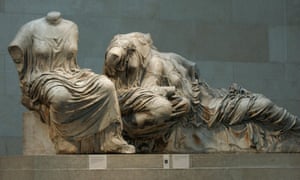Επιμέλεια: Ελένη Σοφού
(Για το ξενόγλωσσο αναγνωστικό μας κοινό)
Mark Brown Arts correspondent
Some of the Parthenon marbles in the British Museum. Photograph: Matthew Fearn/PA
The director of the British Museum has provoked anger by suggesting the removal of the Parthenon marbles from Greece in the 19th century could be seen as “a creative act”.
Hartwig Fischer gave an interview to the Greek newspaper Ta Nea in which he ruled out returning the 2,500-year-old sculptures, which many people in Greece and elsewhere regard as stolen.
Greece desperately wants the sculptures, popularly known as the Elgin marbles, back but has been rebuffed repeatedly by the British Museum.
Asked about the argument that it should be seen more as a rejoining of the sculptures than a return, Fischer said the British Museum offered a different way of interacting with the marbles, “posing different questions because the objects are placed in a new context”.
He added: “We should appreciate this opportunity. You could, of course, be saddened by the fact that the original environment has disappeared. When you move a cultural heritage to a museum, you move it outside. However, this shifting is also a creative act.”
The same could be said for the Acropolis Museum created in Athens, said Fischer. “Nothing that we admire at the Acropolis Museum was created for the Acropolis Museum. They are close to the original environment, but they have again moved away from it and have been transformed through this act.”
There are many who will not see the early 19th-century removal from Greece of the marbles by agents of the 7th Earl of Elgin as “creative”. Lord Byron likened it to vandalism, lamenting in verse in Childe Harold’s Pilgrimage: “Dull is the eye that will not weep to see / Thy walls defac’d, thy mouldering shrines remov’d / By British hands.”
George Vardas, the secretary of the International Association for Reunification of Parthenon Sculptures, tweeted: “Seriously. What was so creative in the destruction of the temple and looting and pillage of a nation’s keys to its ancient history?”
He called it “astonishing historical revisionism and arrogance”, and added: “The imperial condescension of the British Museum knows no bounds.”
Elsewhere in the interview, Fischer rejected the idea that Greece was the legitimate owner of the marbles. “The objects in the collection of the British Museum are owned by the museum’s commissioners,” he said.
There would only be a possibility of a loan if Greece were to recognise the British Museum’s legitimate ownership of the marbles, he added.
Myrsini Zorba, the Greek culture minister, issued a statement on Saturday condemning Fischer’s “legitimate owner” comments as exhibiting “a narrow and cynical managerial mindset”.
“It is regrettable to hear this by the director of the British Museum and a well-known art historian. His remarks downgrade cultural heritage from an invaluable universal value to a mere exchange sale.”
The British Museum is prevented by UK law from returning the marbles, although the Labour leader, Jeremy Corbyn, has said he would repatriate them if his party were elected.
A spokesperson for the British Museum said: “Hartwig Fischer was stating the longstanding position of the British Museum. We believe there is a great public benefit in being able to see these wonderful objects in the context of a world collection. The museum lends extensively across the world, and some loans are long-term but not indefinite’.”
Πηγή: https://www.theguardian.com

Δεν υπάρχουν σχόλια:
Δημοσίευση σχολίου
Σημείωση: Μόνο ένα μέλος αυτού του ιστολογίου μπορεί να αναρτήσει σχόλιο.